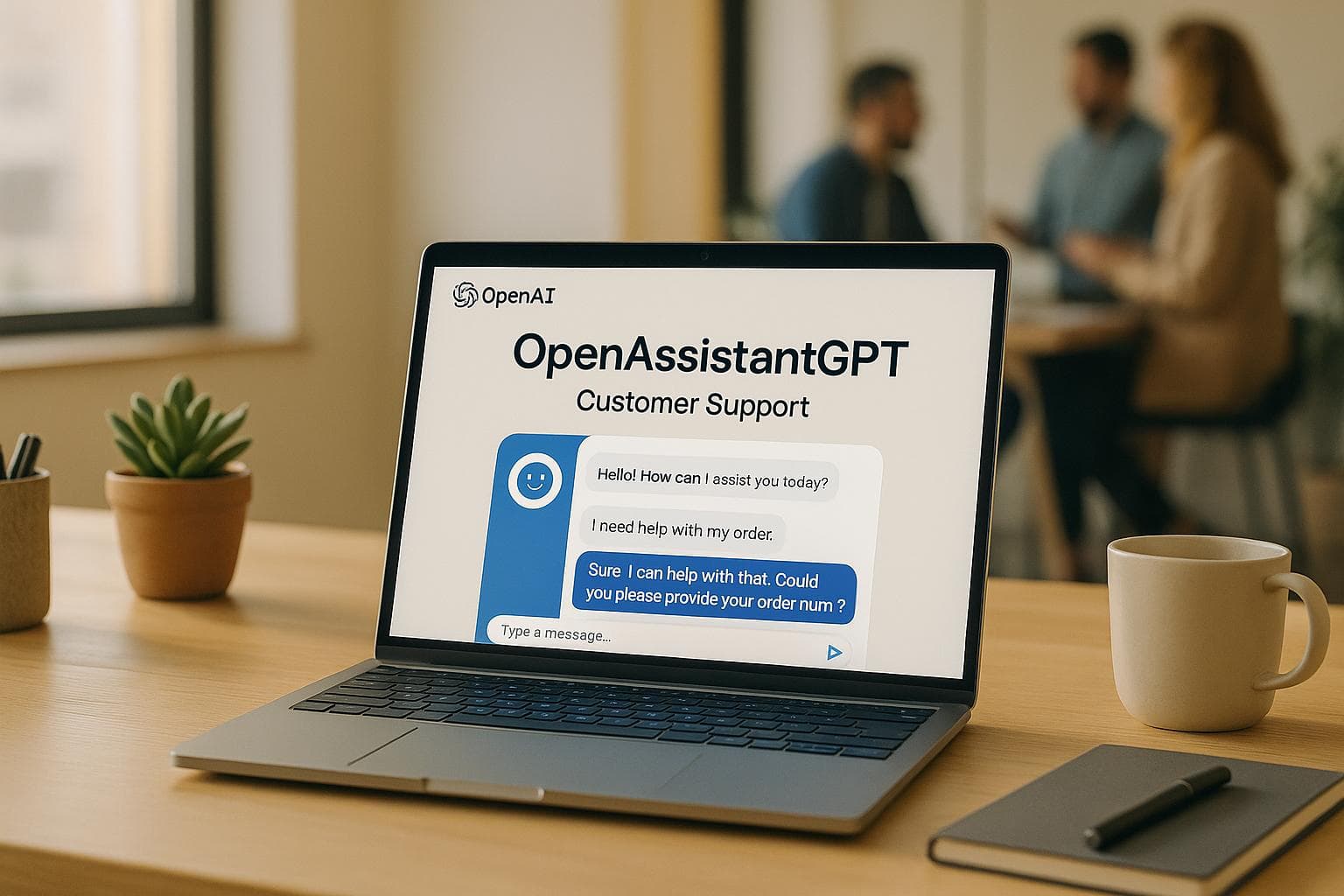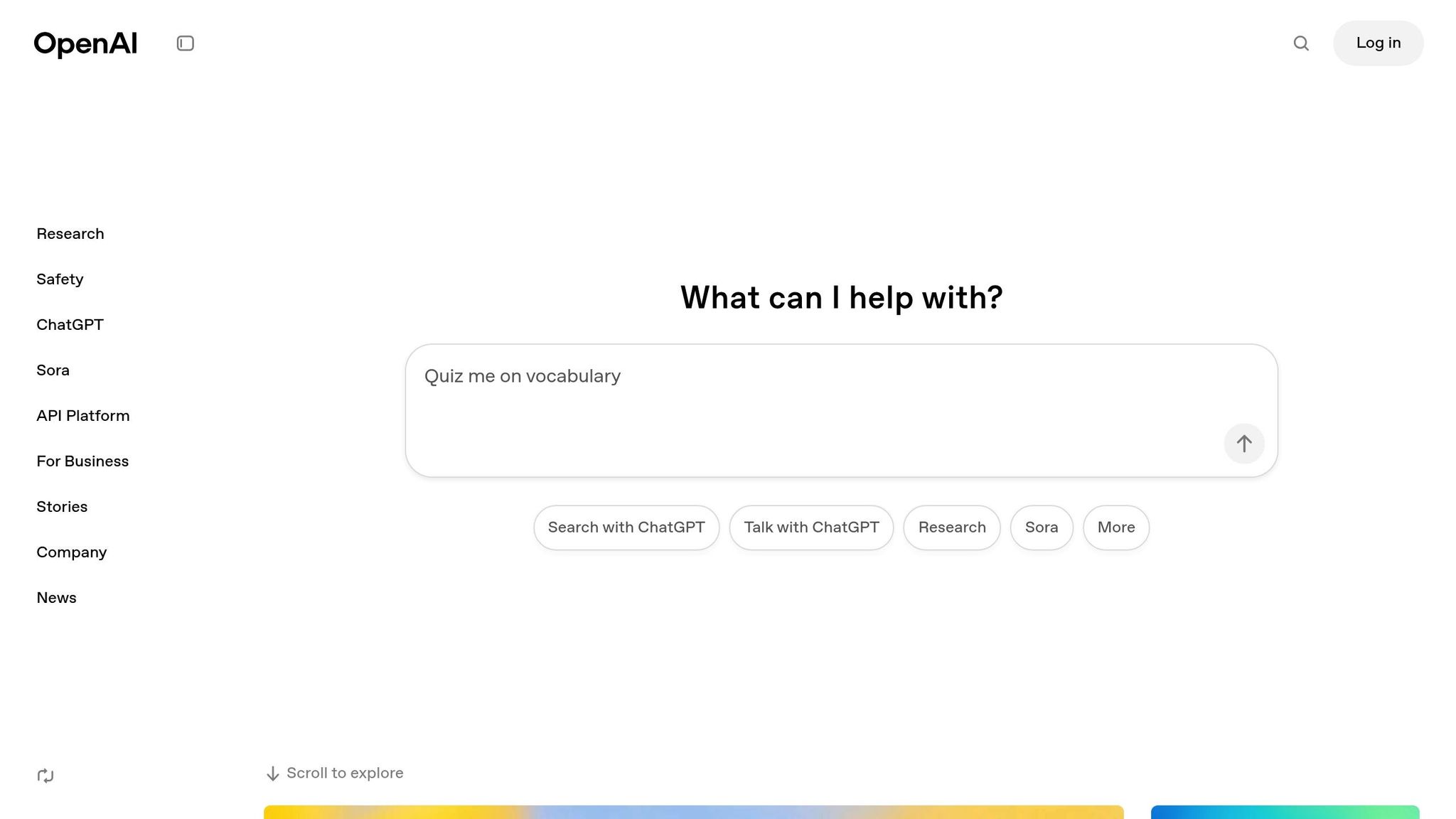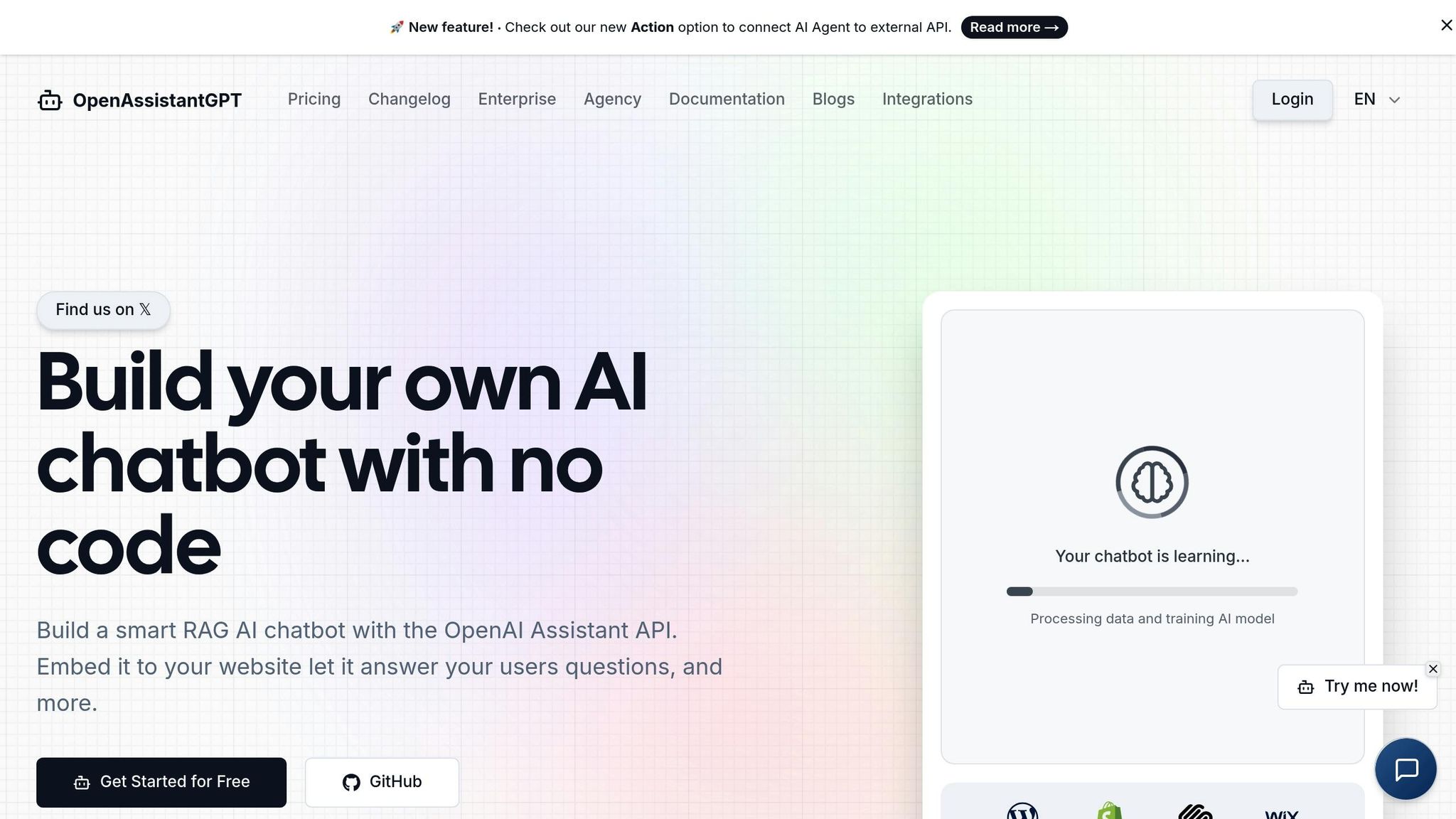OpenAI Integration OpenAssistantGPT Customer Support Automation with low-code Backend

OpenAI Integration OpenAssistantGPT Customer Support Automation with low-code Backend
Struggling with slow response times and high support costs? OpenAssistantGPT combines AI and low-code tools to simplify customer support automation. Here's what it offers:
- Faster Resolutions: 60% quicker response times.
- Cost Savings: Save $25,000 annually.
- Ease of Use: No coding needed - drag-and-drop setup.
Key features include AI-powered chatbots, web crawlers for data processing, and secure integrations. Plans start at $18/month, making automation accessible for businesses of all sizes.
Want to streamline your support? Read on to learn how to set up and maximize OpenAssistantGPT.
Open AI Assistants API Tutorial (Bubble) | OpenAI DevDay ...

Core Components
OpenAssistantGPT combines advanced AI features with a low-code approach to streamline customer support automation. Here's a breakdown of the key elements that power this system.
OpenAssistantGPT Main Functions

The platform is built around four primary components, each designed to enhance efficiency and support automation:
| Function | Description | Business Impact |
|---|---|---|
| AI Chatbot Engine | Utilizes OpenAI's GPT-4, GPT-3.5, and GPT-4o models | Speeds up resolution times by 60% |
| Web Crawler | Automatically gathers and processes website data | Reduces time spent on data retrieval |
| File Processing | Handles CSV, XML, and image attachments | Processes inquiries faster |
| Security Suite | Features SAML/SSO authentication for private chatbots | Provides enterprise-level security |
These features integrate smoothly with low-code tools, making automation easier to implement.
Low-Code Platform Basics
The platform simplifies development and automation through:
Visual Development Tools
- Drag-and-drop interface with pre-built templates
- Custom action builders for integrating APIs
- Automatic response routing
- Customer data collection
- Lead generation functionalities
Integration Methods
OpenAssistantGPT offers flexible integration options to meet a variety of business requirements:
- Website Integration Embed the system directly into your website using a simple code snippet. This allows for immediate customer interaction while maintaining your site's design and functionality.
-
Data Source Connection
Leverage the crawler feature to connect with multiple data sources. This enables the platform to:
- Automatically process website content
- Analyze customer documents
- Handle file attachments for comprehensive support
-
API Integration
With the AI Agent Actions feature, the platform can dynamically interact with external systems by:
- Querying backend databases
- Updating customer records
- Triggering automated workflows
"Build your own AI chatbot with no code." - OpenAssistantGPT
The platform supports scalable deployment, starting with a free plan. The Basic plan, priced at $18/month, includes 9 chatbots with unlimited messages. The Pro plan, costing $54/month, offers 27 chatbots and advanced customization options.
Setup Instructions
Required Tools and Accounts
Before you begin with OpenAssistantGPT, make sure you have the following tools and accounts ready:
| Account/Tool | Purpose | Requirements |
|---|---|---|
| OpenAI Account | Powers AI functionality | Valid email and payment method |
| OpenAssistantGPT Account | Access to the platform | Google or GitHub login |
| OpenAI API Key | Connects to OpenAI services | Active OpenAI subscription |
| Website Access | For integration deployment | Admin or developer privileges |
Initial Configuration
Once your accounts and tools are set up, follow these steps to configure your environment:
1. API Setup
Log in to the OpenAssistantGPT dashboard and paste your OpenAI API key. This ensures direct billing through OpenAI, avoiding extra charges.
2. Response Configuration
Customize your chatbot’s communication style to align with U.S. customer service standards:
- Define message length limits
- Set a friendly and professional tone
- Add notifications for out-of-scope requests
- Use U.S. date and time formats (MM/DD/YYYY)
Website Integration
You can easily integrate OpenAssistantGPT into your website, even with basic coding knowledge. Here are the two main options:
Simple Embed
Add the following code snippet to your website’s HTML:
<!-- Add this code to your website's HTML -->
<div id="openassistant-chat"></div>
<script src="https://cdn.openassistantgpt.io/widget.js"></script>
NextJS Integration
For developers using NextJS, OpenAssistantGPT provides an SDK designed for seamless Vercel deployment.
Data Source Setup
To enhance your chatbot’s knowledge base, configure its data sources as follows:
1. Web Crawler Configuration
- Use browser developer tools (F12) to test query selectors.
- Example: Use
document.querySelector("[id='root']")to target specific content. - Stick to publicly available information to maintain security.
2. File Management
- Set up file upload options.
- Adjust web crawler parameters.
- Define how uploaded files and messages will be processed.
Launch Preparation
Before going live, complete these final checks:
1. Security Verification
- Ensure SAML/SSO settings are configured properly (available with the Enterprise plan).
- Verify compliance with data privacy standards.
2. Performance Testing
- Test the accuracy of chatbot responses.
- Check how well it handles various message types.
- Confirm that all integrations function smoothly.
sbb-itb-7a6b5a0
U.S. Market Requirements
U.S. Format Standards
To align OpenAssistantGPT with U.S. standards, use the following formats:
| Format Type | U.S. Standard | Example |
|---|---|---|
| Currency | USD with $ prefix | $1,234.56 |
| Date | MM/DD/YYYY | 05/03/2025 |
| Time | 12-hour format with AM/PM | 2:30 PM EDT |
| Numbers | Comma for thousands, period for decimals | 1,234.56 |
| Temperature | Fahrenheit | 75°F |
| Measurements | Imperial units | 5 miles, 6 feet |
Note: If date and time formats were already set during the Initial Configuration, you can skip reconfiguring them here.
Legal Requirements
Data Privacy and Protection
- Collect only the information that's absolutely necessary.
- Ensure user consent is obtained before gathering data.
- Be transparent about how data is used and stored.
Transparency Guidelines
- Clearly disclose when users are interacting with an AI system.
- Accurately describe the chatbot's capabilities and limitations.
- Include disclaimers about AI interaction.
Accessibility Standards
- Comply with ADA (Americans with Disabilities Act) requirements.
- Ensure compatibility with screen readers and keyboard navigation.
- Offer alternative support options for users who need them.
The FTC requires AI chatbot deployments to include compliance programs, staff training, and regular audits. These measures not only meet legal standards but also enhance the customer experience.
Customer Experience Standards
Communication Style
- Maintain a friendly and professional tone.
- Use direct, solution-oriented language.
- Include empathetic phrases like "I understand" and "I'll help you with that."
Response Standards
- Acknowledge user inquiries immediately.
- Provide estimated resolution times.
- Offer clear next steps and escalation options if needed.
Quality Assurance
- Regularly review AI responses to ensure accuracy.
- Monitor for any signs of bias in interactions.
- Track customer satisfaction through feedback and metrics.
- Address any identified issues as quickly as possible.
Performance Tracking
Success Metrics
Keep an eye on these KPIs to measure how OpenAssistantGPT is performing:
| Metric Category | Key Indicator | Goal |
|---|---|---|
| Ticket Management | Support Ticket Volume | 35% reduction |
| Resolution Efficiency | Time to Resolution | 60% faster |
| Cost Impact | Annual Support Expenses | Save $25,000 |
| Customer Experience | CSAT/NPS Scores | Track consistently |
Set up your dashboard to monitor key areas like ticket volume, resolution speed, expenses, and customer satisfaction.
Results Comparison
After adopting OpenAssistantGPT, businesses often see noticeable improvements. Here's an example:
| Performance Area | Before Implementation | After Implementation | Impact |
|---|---|---|---|
| Support Tickets (Monthly) | 1,000 | 650 | 35% reduction |
| Resolution Time (Minutes) | 45 | 18 | 60% faster |
| Operating Costs (Annual) | $75,000 | $50,000 | Save $25,000 |
To track progress:
- Start by establishing a 30-day baseline for current support metrics.
- Monitor changes during the first 90 days after implementation.
- Compare historical support costs with current expenses to calculate ROI.
These metrics not only measure success but also help refine your approach to support automation.
Wrap-up
Main Points Review
OpenAssistantGPT simplifies U.S. customer support by combining low-code backend integration with improved efficiency. The platform enhances support operations through automated responses, quicker resolution times, and reduced costs. It also provides tools like no-code chatbot creation, seamless website integration, and advanced AI capabilities. For detailed performance metrics, refer to earlier sections.
This approach ensures that support automation is within reach, even for teams without deep technical expertise.
Implementation Steps
To get started with OpenAssistantGPT, follow these steps:
-
Initial Setup
- Test the platform’s features
- Train your AI assistant
- Evaluate its performance
-
Platform Configuration
- Connect your OpenAI API key
- Upload your knowledge base
- Embed the chatbot on your website
-
Launch and Scale
- Select a plan that suits your needs:
- Basic Plan ($18/month): Includes multiple chatbots
- Pro Plan ($54/month): Offers advanced features
- Enterprise Plan: Custom solutions tailored to your business
- Select a plan that suits your needs:
"Build your own AI chatbot with no code. Our AI-powered chatbots deliver measurable business results by reducing support costs and improving customer satisfaction." – OpenAssistantGPT
Visit openassistantgpt.io to start automating your customer support and modernizing your operations.
FAQs
How does OpenAssistantGPT protect data security and privacy during integration with existing systems?
OpenAssistantGPT prioritizes the security and privacy of your business data at every step of the integration process. Users maintain full control over their data, including inputs and outputs from the API and ChatGPT products.
To safeguard sensitive information, OpenAssistantGPT undergoes regular third-party security assessments and penetration testing. It is also designed to comply with key privacy regulations like GDPR and CCPA, with options for a Data Processing Addendum to meet specific business requirements. This ensures a secure and compliant experience tailored to your needs.
What are the differences between the Basic, Pro, and Enterprise plans, and how do I choose the best one for my business?
OpenAssistantGPT offers three plans designed to meet different business needs: Basic, Pro, and Enterprise.
- Basic: Ideal for small businesses, this plan includes up to 9 actions per month and costs $18/month.
- Pro: Perfect for advanced integrations, it supports up to 27 actions per month and is priced at $54/month.
- Enterprise: Tailored for large-scale deployments, this plan offers custom features and pricing based on your specific requirements.
To choose the right plan, consider the size of your business, the complexity of your customer support workflows, and the number of API actions you’ll need each month. For personalized guidance, reach out to our sales team to discuss your goals and requirements.
Can OpenAssistantGPT be tailored to meet our company’s customer service standards and branding?
Yes, OpenAssistantGPT can be customized to align with your company’s unique customer service standards and branding requirements. By leveraging its flexible architecture and integration capabilities, businesses can fine-tune responses, tone, and workflows to reflect their brand identity and ensure a consistent customer experience.
Additionally, low-code platforms make it easier to implement these customizations without extensive technical expertise. This allows businesses to quickly adapt the solution to their specific needs while maintaining efficiency and professionalism in customer support operations.